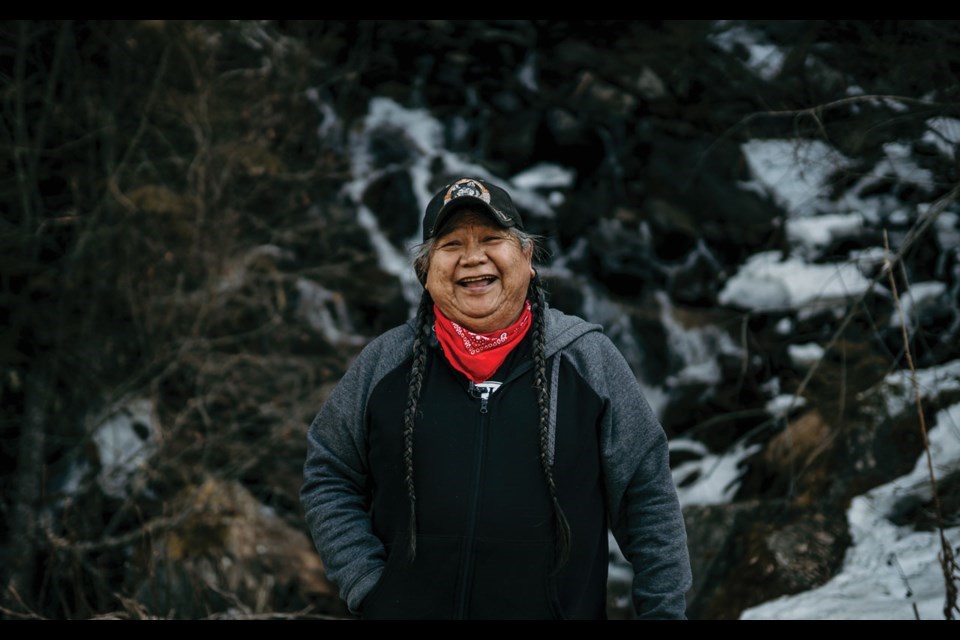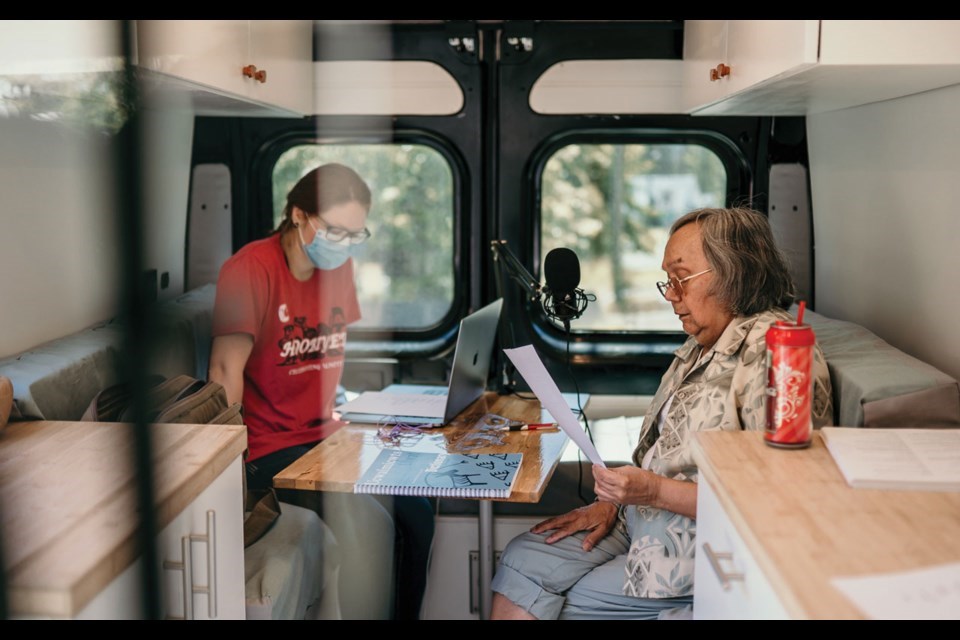In mid-March, Valerie St-Arnaud and her husband Dave Leveille found themselves hurtling cross-country in a large, black RAM Promaster van during not just a snowstorm, but also a burgeoning pandemic.
The couple had just purchased the van from Ontario and were in the process of bringing it back home to Pemberton.
"We were at our family's house in Quebec and heard about social distancing, but we had to bring the van in 10 days because our registration was expiring," St-Arnaud explains. "We did the road trip across Canada and there was no one on the road. It was just the two of us. We got back on March 23 just in time. There was a huge snowstorm and we were freaking out."
Fast forward a few short months and not only has so much changed globally, but the couple has also completely transformed the van in that time.
On Thursday, June 18, the van officially began to fulfill its destiny as a mobile recording studio as part of Bonding Beaver Media—St-Arnaud and Leveille's company that aims to foster and support the preservation of Indigenous languages through multimedia—when they travelled to the home of Lil'wat Nation elder Priscilla Ritchie to record.
"It's beautiful," Ritchie says about her first impression of the van. "It's neat to have it come to my place instead of trying to find a way to get [to a recording studio]."
Mobile immersion
St-Arnaud first began working with the Lil'wat Nation around five years ago when she came on board as a contractor to help edit down 200 hours of film into a one-hour movie.
 "I volunteered a lot of my time initially, so it created a really good connection, and meeting the elders was awesome," she says. "They started realizing online resources and videos are the best ways to preserve language and culture. A lot of my [subsequent] contracts were focused on preserving language."
"I volunteered a lot of my time initially, so it created a really good connection, and meeting the elders was awesome," she says. "They started realizing online resources and videos are the best ways to preserve language and culture. A lot of my [subsequent] contracts were focused on preserving language."
The Lil'wat Nation has made a huge push in recent years to not just preserve its Ucwalmícwts language, but also help it flourish in the community and increase the current rate of fluent speakers, which sits at less than three per cent. A major concern with elders getting older was that the language could disappear along with them.
At the post-secondary level, Mount Currie's Ts'zil Learning Centre offers language skills classes; Ucwalmícwts is part of the curriculum at local elementary and high schools; and at the Xet'ólacw Community School, students from Kindergarten to Grade 3 can take part in an Ucwalmícwts immersion program.
The Lil'wat Nation also hosts the First Voices website as a community resource for language learners. Anyone can simply log on, click on various words and phrases and hear the Ucwalmícwts word as well as its proper pronunciation and English translation.
That latter online resource is what St-Arnaud's roving recording studio is contributing to.
"It's really in demand right now," she says. "My end goal is not just for me to be able to drive the van around and record with elders, but also train the youth so they can go see their grandma and record the language. Our objective is to see more of those overall fluent speakers in their community and assist them to be able to do that."
(St-Arnaud, who is not Lil'wat, has also taken language classes to learn Ucwalmícwts.)
Initially, she and the Lil'wat elders were holed up in the dedicated recording space at the Ts'zil Learning Centre to record. But it was tricky.
"It's so hard for them to travel around [and] they come to the community centre to record language, and you can hear everyone in the building," St-Arnaud says. "We have this equipment that's high end, but you have trouble hearing the audio."
One day, St-Arnaud was talking about her company, Bonding Beaver Media, and the language preservation work she was doing with Dawn Johnson, former executive director at Stewardship Pemberton, where she had done some volunteer video work in the past. By chance, Johnson had recently chatted with Verna Stager, the education director at the Xet'ólacw Community School, who had an idea.
"How cool would it be to have a van and travel everywhere and preserve language and [shoot] video?'" Stager said to Johnson.
"She was laughing about it saying, 'There's a van for everything now," St. Arnaud recalls.
Immediately struck by the concept, St. Arnaud quickly followed up with Stager, who was keen to go head with the project.
When she first conceived of the idea, Stager imagined it would save time trying to arrange travel with elders and, on top of that, would allow elders with limited mobility or health issues to take part.
"The other advantage, of course, was being able to share it," Stager says. "The cultural centre, the school, the band office, when they're doing work on inherent rights and wanting to record elders, it makes a lot of sense for sharing. I'm thinking that it's this little space everybody will come to know."
She also believes it will add to the resources teachers at the school will have. "At Xet'ólacw, we have an immersion program, so we're translating a lot of information and writing our own curriculum … We just finished some of that work," says Stager. "So the staff are eager to get to have enough resources to do a really good job of teaching the language. It will be online and I think there's a number of ways that the teachers can use it in the classrooms, but it also can be used to improve the fluency of the language teachers."
Overall, Stager was surprised to see just how quickly St-Arnaud turned the project around after that call.
"I was actually a bit shocked that Val jumped on the way she did," she adds. "But I'm thankful she did."
Lost in translation
Translating an entire dictionary is no quick or easy task.
In one session, St-Arnaud and the fluent Ucwalmícwts speaker she's working with can record 50 to 100 words per hour. But the challenge is some Ucwalmícwts words don't have direct English translations. (The written version of the language, in fact, was only created in 1974 by Simon Fraser University linguist Dr. Jan Van Eijk.)
One example of an English word without a direct translation they ran into was "stewardship," so they settled on an Ucwalmícwts translation of "keeper of the land."
"Sometimes we could be there for hours until they have a proper translation for it," St-Arnaud says.
But for Ritchie, a Lil'wat elder who's been part of the project, the effort is well worth it. She learned Ucwalmícwts from her father, who university researchers would consult about the language.
"This is just another step towards what he was trying to do: preserving our language and our way of life," Ritchie says. "I spoke the language growing up, but the more you don't use it, the more you lose. This way, it seems to be encouraging us to use our language more or try to find more ways to say things in our traditional way."
Language isn't just spoken words, she adds. It's identity.
"A lot of words have personal meaning for us, especially our place names and river names and our own personal names that are handed down … It was getting lost.
"Here we have technology that can do these things now. We can record them and save them on the computer or even for people to be using them on their iPad nowadays. It's exciting."
It's a fulfilling personal challenge too, Ritchie adds.
"I enjoy it. It challenges my vocabulary and my pronunciation. We do one word at a time or everyday sentences."
St-Arnaud initially grappled with being a white woman coming into the community to work on a deeply cultural project. To that end, it was important for her to build relationships, try to learn the language herself, and, most importantly, mentor young community members so they could carry on the work.
"I'm so happy I get to do something so fulfilling," she says. "At first I was like, 'Who am I to come in and do that?' But eventually, you realize you're helping and it's such a great community to work with … The difference between me and other companies that aren't located in B.C. is I can mentor. At the end of the day, it's their language, their community, it gives them the opportunity to record their own elders and create jobs."
Eventually, St-Arnaud hopes to bring the van to other Indigenous communities that are also working on language preservation.
"For sure there's going to be a little bit of hesitation when we work with new nations," she says. "If you work with that nation, you need to know where they're coming from and where that resistance comes from."
Before COVID-19, Bonding Beaver had arranged to travel to a band near Chilliwack for recording, but that's been put on hold due to the pandemic.
"At the end of the day, I think we just have to go for it," St-Arnaud says. "We just had such good feedback and we see such a need for it."
Find the original story here.




